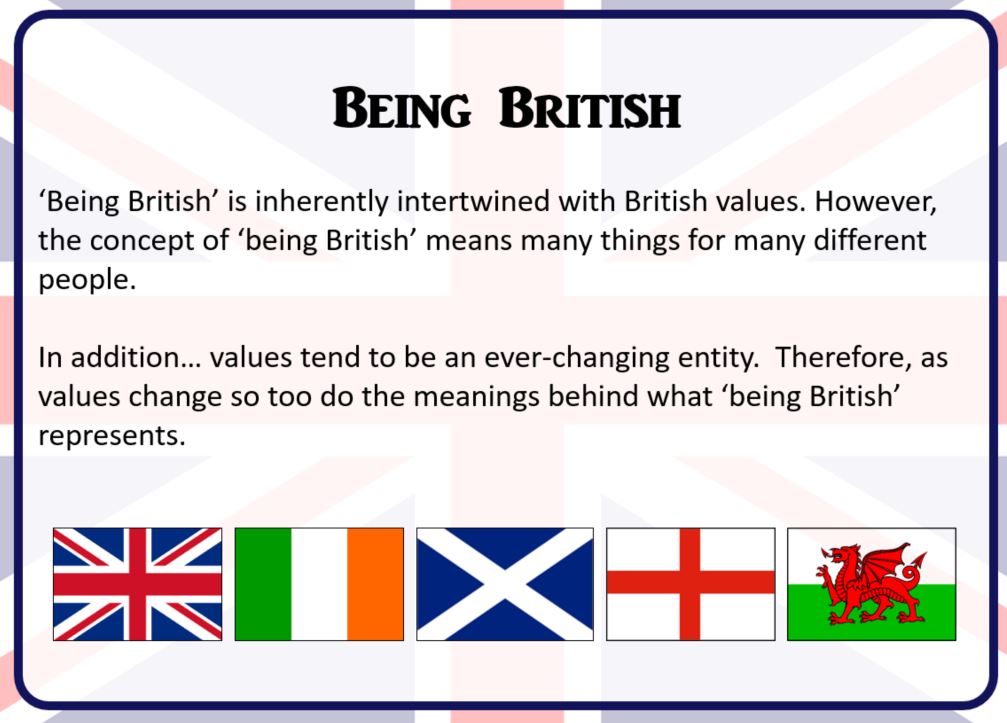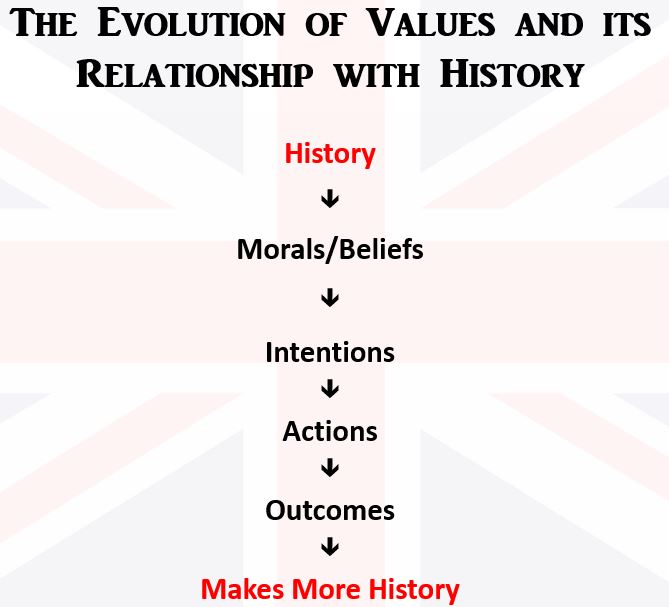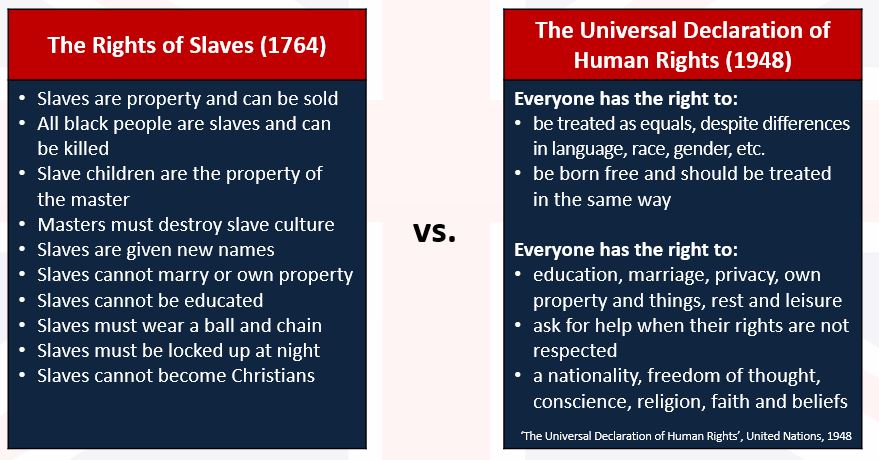⚠️ Test Running in Guest Mode
Important: Your final mark will not be saved.
The Development of British Values Notes
Page: The Development of British Values
Activity
Create a mind map to answer the following questions:
What are your own values about life?
Do any of them reflect your identity or nationality?
The Definition of ‘Value’
val·ue noun
- The regard that something is held to deserve; the importance, worth, or usefulness of something: ‘your support is of great value’
- A person's principles or standards of behaviour; one's judgement of what is important in life: ‘they internalize their parents' rules and values’
The Five British Values (According to Ofsted)
- Democracy
- The Rule of Law
- Individual Liberty
- Mutual Respect
- Tolerance of Those of Different Faiths and Beliefs
Being British

The Impact of History
Social history, political history, economic history, religious history and cultural history all inevitably have an impact on the status quo at any one time. This then impacts on the current value system of any society, whether this impact is miniscule impact or major.
This is perhaps why values are rarely static. British values have certainly evolved over the past few hundred years and more.
The Evolution of Values and its Relationship with History
History, in its simplest terms, is a set of events that impact on society; it directly affects the evolution of British values. As historical events take place and affect society, the values of that society begin to evolve.
It is helpful to understand that values can easily evolve when you think of the following simple structure for historical events:
HISTORY occurs from a foundation of a set of MORALS/BELIEFS, which then shape your INTENTIONS, which lead to ACTIONS, which have OUTCOMES.
It is these OUTCOMES that cause historical events; these may affect the original moral/belief by the time the event changes the original intention… due to ‘everyone else’s’ input of diverse morals/beliefs.

Universal Concepts…?
While values are not particularly stagnant, many of them are universal concepts shared globally by countless human beings around the world, e.g. ‘freedom’ and ‘equality’.
That said, ‘equality’, for example, has not always been a concern as a British value. British values evolving over time can be illustrated by looking at the history of Parliament in Britain over the past 1,000 years.
We will also look at how values have evolved since Britain’s role in the transatlantic slave trade, as well as Britain’s role in abolition.
History of Parliament in Britain Over the Past 1,000 Years
Up until 1215 and the Magna Carta, the king or queen of Britain held absolute power over the land - not a very equal system.
The Church and nobility had more power of their own (and freedom) after 1215. However, women and people who didn’t own land were not entitled to vote and, therefore, not entitled to a voice. By today’s standards, again, not much equality there either!
Thanks to the efforts of the National Union of Women’s Suffrage Societies, formed in 1897, women were legally entitled to the same voting rights as men 30 years later, in 1928, with the Equal Franchise Act. Gender equality in voting at last!
War and Conquest: The Impact of Invaders on the British Isles
Britain is not one distinct race. Our history means that our values have been influenced by the numerous invaders who came to Britain during the past 2,000 years.
The Celts were the original inhabitants of Britain. They lived in isolated settlements and were ruled by chiefs and worshipped pagan gods. In 55 and 54 bc the Romans invaded, and 100 years later they were successful. The Romans left a legacy in Britain, including creating systems of government to help rule the cities they had invaded.
The Romans left in ad 410 but left behind ancestors as well as Roman buildings including roads, baths and villas. They had even introduced a different religion, Christianity, into some areas of Britain. We had become more diverse because of these invaders.
Once the Romans left, Britain was once again open to invasion, this time from the Anglo-Saxons and the Vikings in Scandinavia. When the Vikings came they took over some areas in the north of England and often integrated with the local population. Viking rulers would often marry the daughters of Celtic chiefs to promote unity, and this often meant a merging of Celtic, Viking and Roman cultures.
A lot of our language and place names can be traced back to Viking times. Place names ending in -by (such as Derby or Whitby) come from the Viking word ‘by’ that meant farm or homestead.
The Vikings also had an ‘althing’ or parliament, in which all freemen would meet to make laws. This is a very basic version of democracy, which would become one of the core British values we hold today.
The final invaders came in the form of the Normans, who took control from the Anglo-Saxons in 1066. The Normans have had a great impact on British values and culture in a number of ways. King Charles III, our current head of state, is a direct descendant of William the Conqueror. Normans in power also mingled with the Anglo-Saxons and this meant our language is formed from a mixture of Norman and Anglo-Saxon words.
All these invaders shaped Britain and her values. It also shows how Britain over 1,000 years ago was already a mixture of various different cultures, races, ethnicities and religions. Each society learnt how to tolerate and accept the cultures that came before – another key component of British values.
England Rules Over the Whole of Britain? …Not Since 1997!
Britain as a whole has traditionally been run from a central government in London, England, which still makes the majority of laws that affect the people of Scotland, Wales and Northern Ireland.
By 1997 however, devolution referendums were held, establishing the Scottish Parliament and the National Assembly for Wales.
In 1998, the Northern Ireland Assembly was also established, allowing all the countries within the United Kingdom to make laws and decisions that affect their own countries.
Tip
A little look at the history of Parliament demonstrates how the values of British society have constantly evolved over time. Have look at this YouTube video...The Impact of History: Britain’s Role in the Transatlantic Slave Trade
A little look at a highly significant aspect of British history can also demonstrate how the values of British society have constantly evolved over time.
Prior to the transatlantic enslavement of African peoples, Africa boasted very rich, diverse cultures and ways of life long before the arrival of European colonialists. West Africa, in particular, was made up of kingdoms, city states and territorial federations. Learning, technology, music, art and the spoken word were thriving aspects of these kingdoms and city states.
After the arrival of Columbus in the Caribbean in 1492, many European countries, including Britain, saw this as an opportunity to increase their own wealth. The French, Dutch and British all established colonies in the Caribbean. This also meant that the Native Amerindians (e.g. Caribs, Arawaks) became enslaved, were massacred or died from European diseases previously unencountered which were brought by the colonists. New sources of labour were now needed…
Britain took inspiration from the Spanish and Portuguese enslavement of Africans in order to develop mainly sugar plantations. The demand for enslaved Africans to use for slave labour rose to an unprecedented level. Chattel slavery of black Africans became legally established by white European slave owners. A chattel slave is a human being who is owned by another human being and is treated as a piece of property. Punishment and abuse of enslaved Africans was rife and they had no legal rights whatsoever. Racially based laws ensured this system of slavery existed for hundreds of years. In the 1640s, through the use of private trading companies, Britain began large-scale slaving.
A triangle of trading between Europe, Africa and the Americas made up the transatlantic slave trade. The European market was thirsty for a constant supply of coffee, rice, tobacco and cotton all produced by African slave labour. People were exchanged for goods and then stuffed onto ships to undertake an eight-week voyage across the Atlantic. Many Africans died on this voyage and they were often thrown into the sea or dumped right at the bottom of the ship, locked away in the very base.
We refer to slaves of African descent as enslaved Africans. They were never willing participants and were, therefore, enslaved. African resistance was so strong in the end that rebellion and resistance grew to an unmanageable level. Many humanitarian campaigns also supported a growing campaign to abolish the transatlantic slave trade.
Britain’s Role in the Abolition of the Transatlantic Slave Trade
Africans themselves played the lead role in their own liberation. Britain also played a key role in the abolition of the transatlantic slave trade.
In 1783, in Britain, a passionate campaign to achieve abolition began. British values were changing, people’s morals and beliefs were changing. Quite often led by black churches, the abolition campaign was also developed in the Caribbean and North America, taking inspiration from the British campaign.
24 years later, in 1807, Britain legally abolished slave trading. However, for a further 60 years the illegal trading of slaves continued.
Tip
The transatlantic slave trade caused dislocation and death on a scale that is hard to imagine today. It is sometimes referred to as The African Holocaust, and it is argued that anywhere between 12 million and 100 million Africans were enslaved and/or killed.The transatlantic slave trade has left some deep and complex legacies between Africa, America and Europe. Black people and people of African descent continue to be at a significant social, political and economic disadvantage within the western hemisphere. Thankfully, human rights have been universal since 1948!

A Stark Look at How British Values Have Evolved Over Time…
A Brief History of Immigration in Britain
You may assume that immigration is a fairly recent phenomenon in Great Britain, but it has been part of our history and culture for centuries.
One of the most significant examples of mass immigration to the UK was by the Huguenots, a group of Protestant French who feared persecution in their own country. They were offered sanctuary by King Charles in 1670 and around 40,000 came over to the UK.
Years later, in the eighteenth century, as Britain's trade grew, European immigrants came over in the form of merchants and lived in port cities to sell their goods. This was a consequence of the growing economy of Great Britain. Also during this time, the forced immigration of Africans happened during the slave trade. However, this immigration stopped once the trade was banned. Towards the end of the nineteenth century, more immigration came from the British Commonwealth from Africa and Asia, and in 1892 the first non-white MP, from India, was elected to the House of commons.
After the Second World War came the next period of mass immigration, as Britain needed more workers because its own workforce had been affected by WWII. Ships were sent to Commonwealth countries and hundreds came from the West Indies in the ship called the Windrush. These men were able to work and live in the UK without restriction as they held a UK passport from a Commonwealth country, and this started the first mass immigration to the UK.
Tip
So, immigration into the UK isn’t a new feature or something that was only allowed to happen because of the UK’s entry into the EU that allowed freedom of movement for those in other EU states. The key British value of tolerance has allowed immigration to happen throughout the past 500 years.
Abortion: A British Value That Has Changed Over Time
The issue of abortion is a controversial one, and is still an issue that divides opinion in Great Britain. However, it is a good example of one value that has changed as society’s knowledge and beliefs have shifted over time.
In the thirteenth century, the Church had power, so stated that abortion was only legal until ‘quickening’. This referred to the time when the soul entered the foetus. As this was not a scientific term, or something that could be proved, this meant there was no set number of weeks at which an abortion could be deemed ‘legal’.
In 1803, abortion laws now carried the death penalty for anyone who carried out an abortion after ‘quickening’, but this was abolished after 1837.
In the early 1900s, values started to change and the right of the mother of the child was taken into account. In 1903, a clause was added that allowed an abortion after ‘quickening’ if it preserved the life of the mother. However, legal abortions were rare, and women often took risks with illegal abortions that could cause permanent damage or death.
In 1938, a doctor was acquitted of performing an illegal abortion on a 14-year-old girl who had become pregnant as a result of rape. This was the first legal case where the mental health, as well as the physical health, of the woman would make an abortion legal.
As advances in science were made, more was found out about when a foetus started to develop consciousness, so a formal time limit was set on when ‘quickening’ took place. This was 24 weeks.
The 1967 Abortion Act states that abortion is legal as long as it is agreed by two medical professionals and happens before 24 weeks, and it’s agreed that the physical or mental health of the mother would be in danger if the pregnancy continued.
Abortion is only legal after 24 weeks if the mother’s life is in danger, the birth would present a grave personal injury, or there is a significant risk that a child would be born with severe physical or mental difficulties.
Tip
Abortion, therefore, is a good example of how the rights and safety of the mother have been balanced with the rights and quality of life of the unborn child.Activity
Spend three minutes writing down all five British values. Then reread this presentation to check them.
How did you do? Are any of your own values written down in the Starter the same as, or very similar to, the official British values?
Or click 'Enter' key!